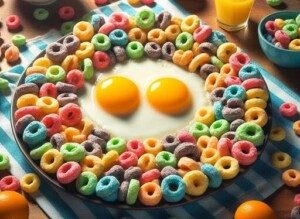Does the “incredible edible egg” beat out cereal when it comes to a heart healthy breakfast?
After all, cereal has been relentlessly marketed as a healthy breakfast food since the 1950s.
Millions of stay-at-home mothers were suckered into believing that something that was poured out of a box—after being made at a huge manufacturing plant—was the best thing you could give your child for breakfast.
And of course, there’s been more than enough cereal ads targeted at adults, such as adult male athletes and women wanting to lose weight.
“Part of this nutritious breakfast” is the mantra of cereal commercials.
Relatively late in the TV commercial game has been ads for eggs, touting their nutritional value.
While some people have BOTH eggs and cereal for breakfast, let’s look at whole eggs vs. cereal when it comes to heart health.
Which is better for your heart: whole eggs or the “healthiest” cereal?
There are a few ways to look at this. First, from the standpoint of nature vs. processed food, the egg wins.
This assumes that the whole eggs don’t have flour and sausage added to them for an omelet.
That old saying, “If it wasn’t around 50,000 years ago, don’t eat it,” rings true here. In nature, carnivores and omnivores eat eggs. They are 100% unprocessed.
But eggs contain cholesterol, right?
“Gone are the days when we blamed egg yolks for high cholesterol,” says Shana Spence, MS, RDN, CDN, a registered dietitian nutritionist based in New York.
“We now know through research and study that high cholesterol is due to saturated fat.
“Egg yolks contain important vitamins and minerals [all in their natural state!] such as calcium, iron, phosphorus, zinc, folate, vitamin B12, choline as well as vitamins A, D, E and K, and essential fatty acids [which are good for the heart].
“Whew! Eggs in general are also a healthy protein option that will leave you feeling full and satiated.”
- Two whole eggs contain two grams of sugar.
- A bowl of some types of cereal may contain as many grams of sugar as a candy bar.
“Cereals can be tricky, but if you look for the right option, they can be a great breakfast option,” says Spence.
The second consideration, then, is the type of cereal. Some are loaded with added sugar, plus unnatural colorings and flavorings.

Freepik.com
A third issue with cereal is the deceptive nutrition information label.
The sugar content for a “serving size” may not seem that bad, till you read that a “serving size” may be as small as three-quarters cup. What adult eats only three-quarters cup of cereal?
How many people stop pouring the cereal when it reaches the tiny “serving size” amount that’s on the nutrition label?
Pour your favorite cereal into a measuring cup—three-fourths way. Is that how much cereal you pour into your bowl for breakfast?
Two whole eggs contain two grams of natural carbohydrate. Your heart won’t mind.
But all the added sugar from cereals—even the high fiber cereals—are of the refined type, which promotes inflammation throughout the body.
Egg Yolks or Cereal for Breakfast?
Certainly, if cereal is one of your favorite breakfast foods, keep eating it.
But know that it’s not bad for your heart to sometimes replace cereal with whole eggs.
Furthermore, if you’ve been eating sugary, highly processed types of cereal, you may want to rethink this if you’re conscious of heart health.
“The number one choice I opt for is oatmeal…homemade, not pre-packaged,” says Spence.
“Oats are great because they contain a ton of fiber that will help fill you up and keep your gut nice and healthy.
“They are also versatile because overnight oats can be made the night before for an easy grab and go.
“If oatmeal is not for you, read the labels and look for whole grains such as wheat, barley, buckwheat, millet and quinoa.
“These grains are some of the healthiest and also contain the most fiber. Try to avoid anything corn or rice based which will not fill you up as much.
“When in doubt, check the nutrition label and make sure that whole grain is listed first in the ingredients.”
But even then, you should continue reading the ingredients to see if sugar is third or fourth on the list. This may still mean a whopping amount of sugar for a “serving size.”
Spence adds, “So overall, when choosing a heart healthy breakfast, opt for something that is high in fiber and protein but low in saturated fat.
“Both cereal and egg (yolks) are a great option, but you still need to pair them correctly. Have some whole wheat toast or fruit with your eggs for fiber and have some Greek yogurt with your cereal for added protein.”


 Shana Spence
Shana Spence
























